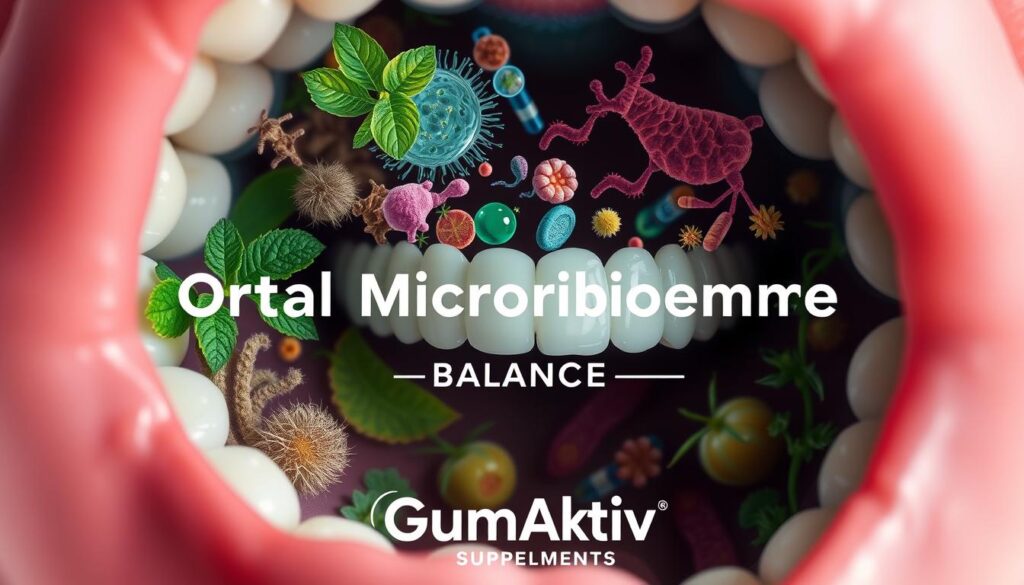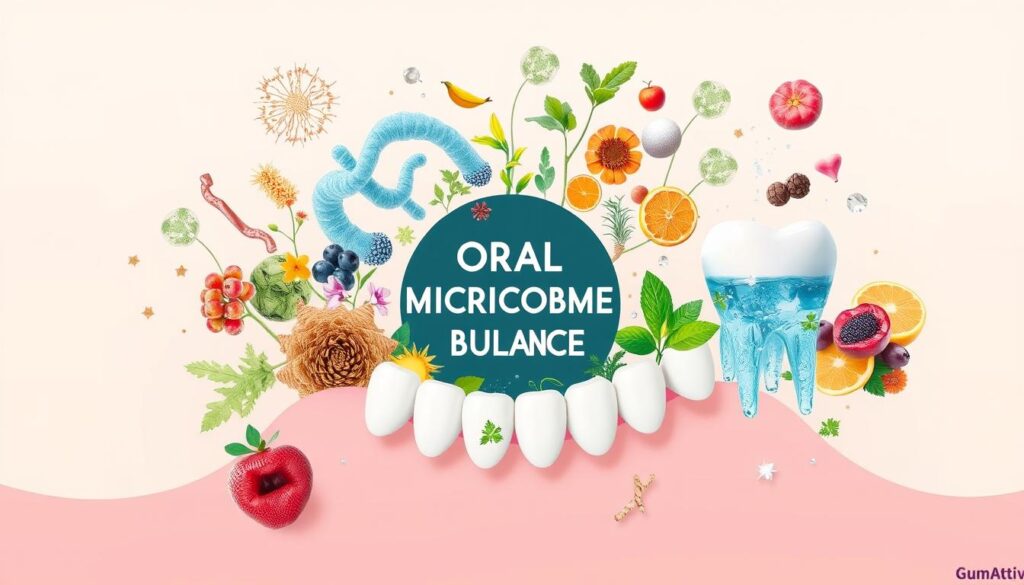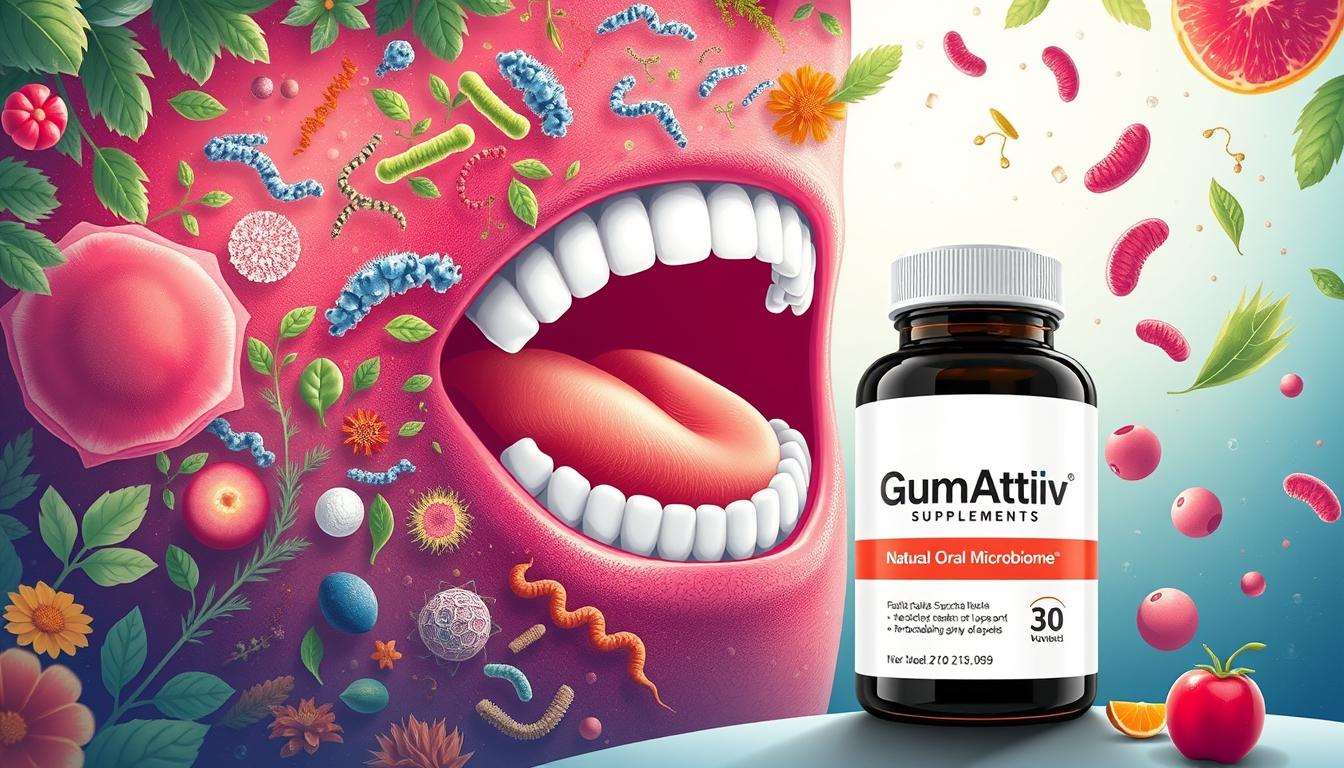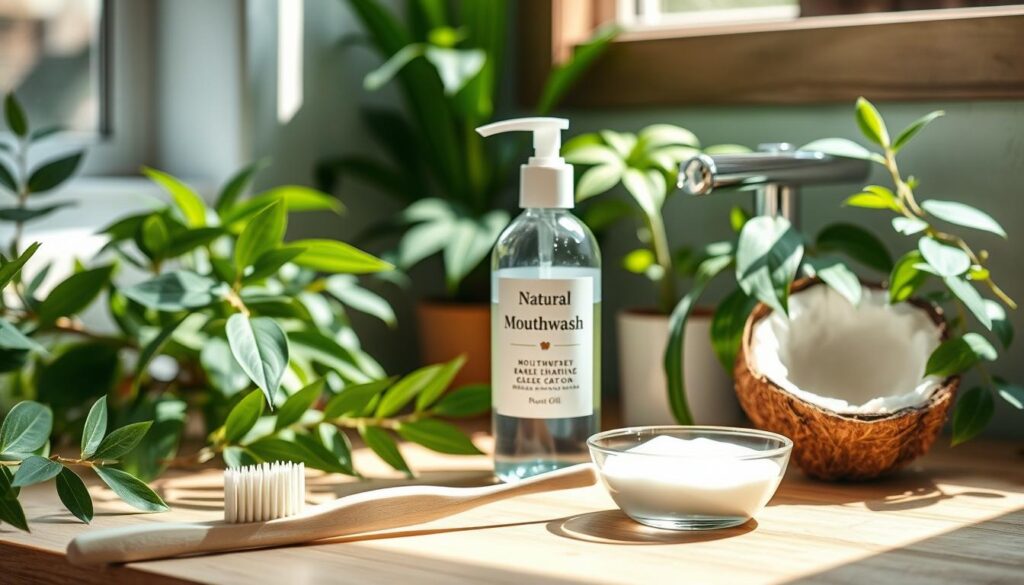Keeping your oral microbiome healthy is key to your overall well-being. A balanced saliva microbiome supports strong teeth and healthy gums, making it essential for lasting dental health. At gumaktiv24.com, we offer natural dental supplements and a complete gum health formula designed to improve your teeth and gum care. Our dental health supplements provide an effective solution to protect and restore the balance of your oral environment with excellent oral microbiome support.
Meet GumAktiv, a new line of oral health supplements. They are made with ingredients backed by science. These supplements aim to balance your mouth’s bacteria, improving gum health and teeth strength. They also help lower the risk of many health issues.
Maintaining a healthy oral microbiome is essential for strong teeth and gums. A balanced oral microbiome helps protect your mouth from harmful bacteria and supports overall dental health. For more information on maintaining oral health, visit Mayo Clinic – Oral Health.
Key Takeaways
- The oral microbiome is crucial for dental and overall health
- GumAktiv supplements provide targeted support for a balanced oral microbiome
- Maintaining a healthy oral environment can positively impact systemic wellness
- Clinically-backed ingredients in GumAktiv help nourish beneficial oral bacteria
- Discover how to optimize your oral microbiome for better overall health
Start your journey to better oral and overall health at gumaktiv24.com. Learn how to achieve a vibrant, balanced oral ecosystem. Enjoy the benefits of a healthier you.
Understanding the Oral Microbiome: The Foundation of Dental Health
The oral microbiome is a mix of tiny living things in your mouth. It’s key to keeping your teeth and gums healthy. This group of bacteria, fungi, and viruses helps keep your mouth in balance.
What Makes Up Your Oral Microbiota
Your oral microbiota has hundreds of different microbes. Each one has its own job. They work together to keep harmful bacteria from taking over. This balance is crucial for your oral health.
The Role of Beneficial Bacteria in Mouth Health
Good bacteria in your mouth protect it. They make compounds that fight off bad microbes. They also help your immune system fight off threats. Keeping a balance in your mouth microbiome helps avoid dental problems.
How Microbiome Balance Affects Overall Wellness
Your oral microbiome is connected to your whole body. A healthy balance in your mouth can boost your overall health. An imbalance has been linked to heart disease, diabetes, and some cancers. So, taking care of your mouth microbiome is important for your overall well-being.
To learn more about supporting your oral microbiome for better health, visit gumaktiv24.com.
The Critical Link Between Oral Microbiome and Systemic Health
Your oral microbiome is key to your overall health. Studies show that an unbalanced saliva microbiome can affect many parts of your body. This includes your dental wellness and more.
The oral microbiota in your mouth is linked to your body’s health. If this balance is upset, it can lead to many health problems. These can range from chronic inflammation to a higher risk of diseases.
- Research shows that bad oral microbiome health can increase your risk of heart disease and stroke.
- Studies also link oral microbiota imbalances to type 2 diabetes, Alzheimer’s disease, and some cancers.
- The link between oral microbiome and respiratory health is strong. Oral bacterial imbalances may lead to respiratory infections like pneumonia.
Keeping your oral microbiome healthy is more than just caring for your teeth and gums. It’s about supporting your overall health. By understanding the connection between your oral microbiome and systemic health, you can improve your dental wellness and life quality. For more info, visit gumaktiv24.com.
Natural Solutions for Supporting Your Oral Microbiome
Keeping your oral microbiome healthy is key for your teeth and body. Luckily, there are natural ways to help. You can add these to your daily routine to keep your mouth’s good bacteria in balance.
Dietary Factors That Influence Oral Health
Your diet greatly affects your oral microbiome. Eating a variety of natural dental health solutions helps. Try to eat more:
- Fiber-rich fruits and vegetables
- Probiotic-rich foods like yogurt, kefir, and fermented veggies
- Healthy fats from avocados, nuts, and seeds
- Green tea, which fights off bad bacteria
Lifestyle Changes for Optimal Oral Flora
Along with a good diet, your lifestyle matters too. Here are some changes to help your healthy oral microbiome:
- Manage stress with meditation or deep breathing
- Drink lots of water all day
- Try to stop or cut down on smoking
- Keep up with brushing, flossing, and using a natural dental supplement
Essential Nutrients for Microbiome Balance
Some nutrients are crucial for a healthy oral microbiome. Make sure you get enough:
- Vitamin C for gum health and immunity
- Vitamin D for immune system and inflammation control
- Zinc for fighting off bad bacteria and healing
- Probiotics to add good bacteria
By adding these natural dental health solutions to your life, you help your oral microbiome. This can lead to better health and happiness. For more tips, check out gumaktiv24.com.
Introducing GumAktiv: A Revolutionary Approach to Oral Health
GumAktiv is a new supplement that changes the game for oral health. It focuses on the oral microbiome, the base of dental health. With natural ingredients, GumAktiv helps keep teeth strong and gums healthy.
GumAktiv’s secret is its special mix. It has probiotics, vitamins, and natural compounds. This blend supports good bacteria in the mouth. It fights off bad bacteria and boosts overall mouth health.
GumAktiv tackles gum problems at their source. It feeds the good bacteria, reducing inflammation and strengthening teeth. People using GumAktiv see healthier gums and feel more confident about their smile.
GumAktiv’s benefits aren’t just in the mouth. Research shows it can also improve overall health. It may boost the immune system, digestive health, and heart health.
Start your journey to better oral health with GumAktiv. Visit gumaktiv24.com to learn more. See how GumAktiv can keep your smile bright for years.
The Science Behind Oral Microbiome Support
Keeping your oral microbiome healthy is key to your overall well-being. Research shows that oral probiotics and microbiome supplements are game-changers. They’re changing how we think about dental health and keeping our mouths balanced.
Research-Backed Benefits of Oral Probiotics
Studies have found many benefits of using oral probiotics daily. These good bacteria can:
- Lower the chance of tooth decay by stopping bad bacteria growth
- Help gums stay healthy and fight inflammation from gum disease
- Make more antimicrobial compounds to protect your mouth
- Make your breath smell fresher by controlling odor-causing microbes
How Supplements Enhance Microbial Diversity
Microbiome supplements, like GumAktiv, help keep your oral microbiome balanced. They have special probiotic strains, prebiotics, and other good stuff. Together, they:
- Boost the variety of good bacteria in your mouth
- Help good bacteria grow and thrive
- Stop bad bacteria from taking over and causing problems
- Help your oral microbiome stay balanced for your health
Adding these science-backed products to your oral care routine can help your oral microbiome thrive. This leads to many health benefits. For more info on oral microbiome support, check out gumaktiv24.com.
Signs of an Imbalanced Oral Microbiome and How to Address Them
Keeping your oral microbiome healthy is key for good dental and gum health. But, many things can upset the balance of good bacteria in your mouth. Knowing the signs of an imbalanced oral microbiome helps you take steps to fix it. This way, you can improve your gum health formula and overall teeth and gum care solution.
What Happens When Your Oral Microbiome Is Disrupted?
The oral microbiome plays a vital role in maintaining healthy gums and preventing gum disease. When this balance is upset, it can lead to conditions like gingivitis. For tips on maintaining healthy teeth and gums, visit WebMD – Oral Health.
Bad breath, or halitosis, is a common sign of an imbalanced oral microbiome. It happens when odor-causing bacteria grow too much. Also, if you often get gum inflammation, or gingivitis, it might mean your microbiome is out of balance. This is because the good bacteria that keep bad ones in check are missing.
Getting cavities or tooth decay is another sign. An unhealthy oral microbiome makes it hard for your teeth to stay strong. Mouth sores, like canker sores or cold sores, also point to an imbalance in your how to improve gum health naturally.
- Eat foods rich in probiotics: Yogurt, kefir, and fermented veggies help add good bacteria to your mouth.
- Keep up with good oral hygiene: Brush, floss, and use mouthwash to keep your mouth clean and healthy.
- Try an oral probiotic supplement: Products like GumAktiv24 can give your gum health formula a boost.
- Limit sugar and refined carbs: These foods feed bad bacteria and upset your oral microbiome’s balance.
- Manage stress: High stress weakens your immune system and makes it harder to keep your mouth healthy.
By tackling the signs of an imbalanced oral microbiome and using a complete teeth and gum care solution, you can improve your dental health. This way, you can keep your gums healthy naturally.

Daily Practices for Maintaining a Healthy Oral Environment
Keeping your mouth healthy is more than just brushing your teeth. It’s about using a full approach to oral hygiene. This includes daily habits that help keep your mouth’s balance. By sticking to a routine, you can make your smile brighter and healthier.
Proper Oral Hygiene Techniques
Good oral hygiene begins with the right brushing and flossing. Brush your teeth gently twice a day, focusing on the gum line. Floss once a day to clean areas your toothbrush can’t reach. Also, use a daily supplement for oral microbiome balance from gumaktiv24.com to boost your oral health.
Timing and Frequency of Oral Care
- Brush your teeth twice a day, ideally in the morning and before bedtime, for at least two minutes each time.
- Floss once daily, preferably before bedtime, to remove food debris and plaque.
- Incorporate a daily supplement for oral microbiome balance from gumaktiv24.com into your routine to support the health and diversity of your oral flora.
- Rinse with an antiseptic mouthwash to further promote oral hygiene and freshen your breath.
By making these daily habits a part of your life, you can keep your mouth healthy and bright. Remember, regular oral care for a healthy and bright smile is essential for a lifetime of good oral health.
Combining Traditional Dental Care with Microbiome Support
For the best oral health, a complete plan is needed. Traditional dental care is key for strong teeth and gums. But, supporting the oral microbiome is also vital. Together, these methods create a balanced and strong oral environment.
Understanding the link between the oral microbiome and dental health is crucial. Supplements to support strong teeth and gums, like those from gumaktiv24.com, help. They work with brushing, flossing, and dental cleanings to boost good bacteria and prevent harm.
- Start a Balanced Oral Care Routine: Keep up with regular brushing, flossing, and dental visits. Also, use best natural solution for oral microbiome balance products. This could be probiotic-rich items or special toothpaste.
- Focus on Microbial Diversity: A diverse oral microbiome is essential. Avoid harsh practices like too much antibacterial mouthwash or aggressive brushing.
- Get Professional Advice: Talk to your dentist or oral health expert. They can help create a plan that mixes traditional dental care with microbiome support. They’ll suggest the best supplements to support strong teeth and gums.
By taking a holistic approach, you can reach your oral health’s full potential. This leads to a best natural solution for oral microbiome balance and a smile that lasts a lifetime. With the right mix of dental care and microbiome support, achieving optimal oral wellness is easier than ever.

Professional Insights: Expert Recommendations for Oral Health
Keeping your mouth healthy is key to feeling good overall. We’ve talked to top dental experts for their best dental health tips for strong teeth and gums and effective ways to cleanse mouth bacteria.
Incorporating a daily oral care routine that includes brushing, flossing, and using mouthwash is crucial for keeping your gums strong. For expert advice on proper gum care and oral hygiene, visit ADA – Oral Health Topics.
“A healthy mouth comes from balancing your oral microbiome,” says Dr. Sarah Greenfield, a top periodontist. “By supporting good bacteria, you help your teeth and gums stay strong and improve your overall health.”
Dr. Greenfield suggests adding GumAktiv, a new oral probiotic, to your daily care. “GumAktiv’s special mix of probiotics and herbs cleanses mouth bacteria and keeps your mouth healthy.”
“GumAktiv is a game-changer in oral health support. I’ve seen firsthand the difference it can make in my patients’ dental wellness.”
– Dr. Sarah Greenfield, Periodontist
Dr. Greenfield also stresses the need for good brushing and flossing. “Regular, gentle cleaning is vital for keeping teeth and gums strong. Brush twice a day and floss often to remove plaque and food bits.”
Following the advice of these dental pros and using products like GumAktiv can help you keep your dental health for strong teeth and gums in top shape.
Conclusion
In this guide, we’ve looked at how important the oral microbiome is for our health. We’ve seen how keeping a balance of good bacteria is key. It shows that taking care of our mouth’s ecosystem is vital for staying healthy.
Using natural ways to care for our mouth is a great step. This includes eating right, making lifestyle changes, and using supplements. GumAktiv, found at gumaktiv24.com, is a product that helps. It uses special probiotics and nutrients to boost our mouth’s health.
Remember, taking small steps can make a big difference in our health. Use the tips and resources from this guide to help your oral microbiome. With the right support, you can keep your smile bright and support your overall health.
By supporting your oral microbiome and following a healthy dental routine, you can maintain strong teeth and gums for years to come. For more professional dental care tips, visit trusted sources like Mayo Clinic – Oral Health.
FAQ
What is the oral microbiome and why is it important for my health?
The oral microbiome is a mix of bacteria, fungi, and other tiny life forms in your mouth. It’s key for keeping your mouth healthy and affects your overall health too. A healthy balance in your mouth helps your teeth and gums stay strong. But, an imbalance can cause dental and health problems.
How can I support a healthy oral microbiome?
To keep your oral microbiome healthy, try these tips:
– Brush, floss, and use dental probiotics regularly
– Eat foods high in fiber, prebiotics, and fermented foods
– Use supplements like GumAktiv for oral health
– Manage stress and get enough sleep, as they affect your mouth’s health
What are the benefits of using GumAktiv supplements for oral health?
GumAktiv supplements help your oral microbiome and dental health. They offer several benefits:
- These supplements balance your oral ecosystem by adding good bacteria.
- They strengthen your teeth and gums, contributing to a better smile.
- In addition, they help reduce inflammation and improve gum health.
- By promoting saliva production, they naturally clean your mouth.
- These products provide your mouth and body with essential nutrients.
How do I incorporate GumAktiv into my daily routine?
Adding GumAktiv to your daily routine is simple. Take one capsule with a meal, best in the morning or with your first meal. This helps your body use the ingredients well. Use GumAktiv with brushing, flossing, and dental visits for the best results.
Can GumAktiv be used alongside traditional dental treatments?
Yes, you can use GumAktiv with traditional dental care. We suggest using it with your regular oral care for a complete approach to health. GumAktiv’s natural ingredients work well with dental treatments like cleanings and fillings.
What are the signs of an imbalanced oral microbiome, and how can GumAktiv help?
Signs of an imbalanced oral microbiome include:
– Frequent gum inflammation or bleeding
– Persistent bad breath or an unpleasant taste
– More cavities or tooth decay
– Receding gums or sensitivity
– Less saliva
GumAktiv can help by balancing your oral microbiome, strengthening your teeth and gums, and improving your oral health. Its natural ingredients support good bacteria, reduce inflammation, and nourish your mouth.



